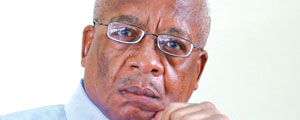
- Mliswa is in a fuming mode after being labelled “extortionist” by Rautenbach
___________________________________________________________________________
ECHOES BY CONWAY TUTANI
Who can tell what Temba Mliswa — who is MP, Zanu PF provincial chairperson, land distribution and business takeover “enforcer”, fitness trainer and “expert” with a finger in every sport all rolled into one — will do next after questioning the source and size of Transport minister Obert Mpofu’s wealth, telling settlers to ignore a Constitutional Court order to vacate a farm, and tearing into government-connected tycoon Billy Rautenbach for refusing to hand over to him $165 million in “facilitation fees” — all this in a few, short days?
Mliswa is in a fuming mode after being labelled “extortionist” by Rautenbach for demanding fees for reportedly connecting the businessman with top government officials — using his Zanu PF political links — to secure multi-million-dollar deals.
By stating that someone is doing something wrong does not imply that you support their rivals, but Mliswa this week shifted blame on to Information minister Jonathan Moyo, saying he was behind the unfavourable reports about him in the public media to gain traction for Moyo’s alleged faction.
Moyo retorted: “This is the ultimate corrupt act to say. You abuse funds, you are caught with hands in the till, it is published and then you say it is destroying the party
. . . You will not go down with that political party, it’s you and you alone, carry your cross alone . . . you are stealing alone . . .”
When Mliswa says $165m is nothing, then you can see how deep-rooted and massive corruption has become.
- Chamisa under fire over US$120K donation
- Mavhunga puts DeMbare into Chibuku quarterfinals
- Pension funds bet on Cabora Bassa oilfields
- Councils defy govt fire tender directive
Keep Reading
If these are the real goings-on behind the curtain, is anything safe from their greed and predation?
It’s so bizarre, so perplexing, so unreal.
Is this any different from street kids acting as self-appointed parking marshals who demand fees from motorists in the Harare central business district?
It is Mafia-style organised crime with highly centralised patron-client networks — because the same names keep cropping up — forcing people to do business with them.
Now that Mliswa has been “short-changed”, Rautenbach’s race as white has suddenly become a factor which it was not before when things were hunky-dory. Mind you, Mliswa has not even invested a cent in those businesses — from the drawing board to operationalisation.
This racketeering has shot up since empowerment and indigenisation became buzz words some three years ago.
Remember a Zanu PF official who wanted to grab an orphanage in Chinhoyi in the name of empowerment from an elderly black woman who had started it because, according to him, she had made enough for herself and it was time to give way to others?
He was not in it for charity — all he saw were donations in money and goods coming his way. That’s how warped and corrupted values have become in this nation.
Furthermore, Mliswa does not appear any cleaner than those he accuses, but he still goes ahead to make it a legal issue.
“Unclean” or “dirty hands” is a legal concept that touches on the behaviour of people who are parties to a lawsuit.
The rule embodied in this doctrine is that the participant in a wrongful act may not recover damages resulting from it.
Essentially, when a person or entity has unclean hands, their actions surrounding the issues of the lawsuit have been criminal or illegal in some ways, and due to this, they are not entitled to what they would ordinarily obtain even if a case otherwise has merit.
Ultimately, what the idea of unclean hands represents is that people must behave in legal ways to retain their rights to recover damages.
When they fail to do this, they may find they no longer have an actionable case.
People defending in a lawsuit may very well try to establish that the other party has unclean hands as a way of escaping payment.
If evidence is strong, such escape could be possible.
Take note both of you, Mliswa and Rautenbach.
Following from that, Mliswa’s defence of his action against Rautenbach has the effect of self-incrimination. This could possibly be an open admission of extortion and to his own detriment.
If anything, he has been accomplices with those he has now turned on.
It’s like a criminal walking straight into the police station to report fellow gangsters for not giving him his share from a robbery or going to court and suing them for that.
This is placing yourself at the very scene of the crime; this is self-incrimination.
Self-incrimination is the act of virtually accusing oneself of a crime for which a person can then be prosecuted.
If Mliswa cannot see that this is what he has done to himself, what else does he fail to see?
It’s not like he has been beaten up and even tortured by the police to get him to confess to a crime that he might not have committed.
He could have kept silent because he has the right, choice and privilege to do so, but in this case he did not have the wisdom to do so.
Maybe Mliswa’s understanding of the law is limited because only recently he took it upon himself to “authorise” people to remain on a Norton farm — far away from his Hurungwe North constituency — in total defiance of an eviction order issued by the Constitutional Court.
He must not mix, muddle and confuse issues.
If he does not know that the Constitutional Court is a court of last resort whose decision cannot be appealed, what else does he not know?
Mliswa has made enough trouble for too many people. It’s time he bore his own cross.











